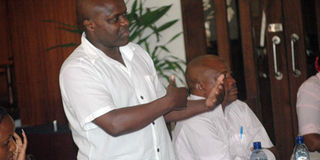Keep your refugees, Kenya tells Denmark

Ministry Interior spokesperson Mwenda Njoka at a past event. The Government has formed a Multi-agency Communications Team to coordinate and disseminate information regarding El Niño rains, he said on October 4, 2015. FILE PHOTO |
What you need to know:
- Interior ministry on Saturday said Kenya would flatly reject such a request, terming the proposal “condescending and ridiculous”.
- They are from Somalia, Ethiopia, Burundi, Uganda and Comoros.
A proposal by opposition parties in Denmark to send Somali refugees to Kenya has angered the government.
Interior ministry on Saturday said Kenya would flatly reject such a request, terming the proposal “condescending and ridiculous”.
“It almost borders on racism. Why would they want to bring them here from their country?” posed Mr Mwenda Njoka, the ministry’s spokesman.
Reports in Danish media indicate that three opposition parties (Danish People’s Party, Liberal Alliance and Venstre) want the government to set up refugee camps outside the country.
Kenya has been propped as one of the countries to host the Denmark-based refugees – funded by Denmark. Kenya is mentioned as a possible country for this bilateral arrangement.
The ruling Social Democratic Party has opposed the suggestion.
Denmark has received more than 20,000 asylum applications this year alone and there has been a nationwide debate on the need to reduce the figures.
But Mr Njoka said Kenya has “enough issues” with the refugees.
“Every country has an obligation to allow refugees in its country,” he said. Kenya hosts 600,000 refugees from Somalia while Denmark hosts 16,000.
This year, Kenya embarked on an operation to flush out aliens where a number of Somalis without refugee documents were deported.
TERRORIST ATTACKS
The operation, dubbed Usalama Watch, was launched following a series of devastating terrorist attacks in Kenya, which were blamed on foreigners.
In the last three weeks alone, 170 aliens have been arrested in swoops across the country and are awaiting to either be arraigned in court or deported.
They are from Somalia, Ethiopia, Burundi, Uganda and Comoros.
“They are in various police stations where their bio data is being analysed before we can take the next course of action,” said Mr Njoka.
Last year, Denmark mulled repatriating Somali asylum seekers to Mogadishu, saying the security situation in the capital of Somalia had improved, according to a report in The Copenhagen Post.
Immigration Service made its decision on the basis of a joint Danish-Norwegian delegation that visited Mogadishu in October 2012, and reported that the Somali capital was safe to the point that rejected asylum seekers would not face persecution if sent back.
Kenya, working with the United Nations High Commission for Refugees, has also started voluntary repatriation programme for Somali refugees.
Statistics from the EU’s statistics agency, Eurostat, shows that Denmark is an easier place to be granted asylum.
Some 42 per cent of applicants in Denmark received a positive decision in 2010.
But during its ten-year reign, Danish opposition leaders Venstre, tightened immigration regulation.
These number of refugees seeking asylum in Europe has risen sharply due to the Arab Spring uprisings and the ongoing fighting in Iraq, Syria, Afghanistan and Somalia.





